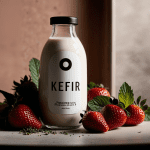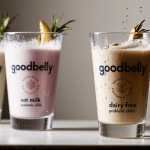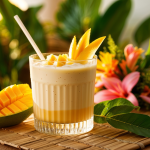What is Yakult?
Yakult is a popular Japanese probiotic drink that was first introduced in 1935 by Dr. Minoru Shirota. It is made from fermented skimmed milk and contains a unique strain of bacteria known as Lactobacillus casei Shirota, which is beneficial for digestive health. The drink is typically sold in small plastic bottles with a distinctive red and silver foil cap, and it has a sweet, tangy flavor with a hint of citrus.
Nutritional Information
A standard 80ml bottle of Yakult contains approximately:
- Calories: 50
- Sugar: 8 grams
- Probiotics: Contains billions of live probiotics per serving, which help maintain gut health.
Yakult has gained international popularity due to its health benefits, including improved digestion and enhanced immune function. It is available in various forms, including Yakult Light, which contains less sugar.
Vegan Yakult Recipe
While traditional Yakult is dairy-based, you can create a vegan version that mimics its probiotic benefits using plant-based ingredients. Below is a simple recipe for making a vegan probiotic drink inspired by Yakult.
Ingredients
- 1 can (400ml) of coconut milk (full-fat for creaminess)
- 2 capsules of vegan-friendly probiotic (ensure they contain live cultures)
- 2 tablespoons of maple syrup or agave nectar (for sweetness)
- 1 teaspoon of vanilla extract (optional, for flavor)
Instructions
Prepare the Coconut Milk:
- Shake the can of coconut milk well to ensure it’s mixed thoroughly.
- Pour the coconut milk into a clean glass jar or bowl.
Add Probiotics:
- Open the probiotic capsules and sprinkle the contents into the coconut milk.
- Stir gently to combine, ensuring not to create too many bubbles.
Sweeten and Flavor:
- Add maple syrup or agave nectar and vanilla extract if using.
- Stir again until well mixed.
Fermentation Process:
- Cover the jar with cheesecloth or a clean kitchen towel to allow airflow while keeping contaminants out.
- Place the jar in a warm area (around 75°F to 85°F or 24°C to 29°C) for about 24-48 hours. The longer it ferments, the tangier it will become.
Refrigerate:
- After fermentation, stir the mixture again and transfer it to the refrigerator.
- Chill for at least 4 hours before consuming.
Serving:
- Shake well before serving. Enjoy your homemade vegan probiotic drink as you would with traditional Yakult!
Storage
This vegan probiotic drink can be stored in the refrigerator for up to one week. Always check for any off smells or changes in texture before consuming.
Health Benefits of Yakult
Yakult is renowned for its health benefits, primarily attributed to its probiotic content. The main probiotic strain in Yakult is Lactobacillus casei strain Shirota (LcS), which has been extensively studied for its positive effects on gut health and overall well-being. Key benefits include:
- Improved Digestive Health: Regular consumption of Yakult can help regulate bowel movements, reducing both constipation and diarrhea by maintaining a balanced intestinal environment.
- Enhanced Immune Function: LcS has been shown to modulate immune responses, potentially increasing the body’s ability to fight infections and diseases.
- Reduction of Harmful Bacteria: The probiotics in Yakult can inhibit the growth of pathogenic bacteria in the gut, promoting a healthier microbiome.
- Oral Health Benefits: Some studies suggest that LcS may positively influence oral microbiota, potentially reducing dental plaque and improving oral health.
- Potential Cancer Risk Reduction: There is evidence that regular intake of LcS may help lower the risk of certain cancers by enhancing gut health and reducing harmful substances produced in the intestines.
Vegan Alternatives for Making Yakult
You can use almond milk or soy milk to create a vegan version of Yakult. Both almond milk and soy milk serve as excellent bases for fermentation due to their nutrient profiles, which can support the growth of probiotics. When using these plant-based milks, ensure they are unsweetened and fortified with calcium or other nutrients if desired.
Tips for Vegan Yakult:
- Fermentation Time: The fermentation time may vary slightly based on the type of milk used. Monitor the taste and consistency to achieve your preferred flavor.
- Probiotic Strains: Use high-quality vegan probiotic capsules that contain live cultures to ensure effective fermentation.
Probiotic Strains in Yakult
Yakult primarily contains two probiotic strains:
- Lactobacillus casei strain Shirota (LcS): This strain is known for its ability to survive gastric juices and reach the intestines alive, where it exerts its beneficial effects on gut health and immune function.
- Bifidobacterium breve strain Yakult: This strain also contributes to digestive health and has been linked to improved immunity and skin health.
These strains work synergistically to enhance overall gut flora balance and provide various health benefits.
Taste Comparison: Homemade vs. Store-Bought Yakult
The taste of homemade vegan Yakult may differ from store-bought versions due to variations in ingredients and fermentation processes. Here are some points of comparison:
- Flavor Profile: Store-bought Yakult typically has a sweet, tangy flavor with a smooth texture due to its specific formulation and fermentation process. Homemade versions may have a more pronounced coconut or nutty flavor depending on the base used (like coconut or almond milk).
- Sweetness Level: Homemade versions allow you to adjust sweetness according to personal preference, while store-bought Yakult has a consistent sweetness level.
- Tanginess: The tanginess in homemade versions can vary based on fermentation time; longer fermentation may yield a more sour taste similar to traditional yogurt.
Overall, while homemade vegan Yakult can replicate some aspects of the original drink, it will have unique flavors influenced by the ingredients used and the fermentation process.
This recipe provides a delicious alternative to traditional Yakult while maintaining the benefits of probiotics in a plant-based format.












